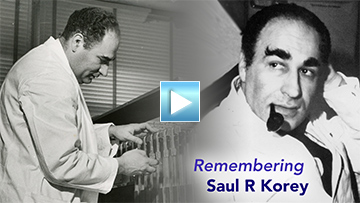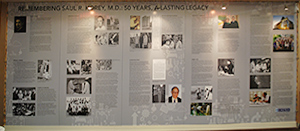

Commemorative Memorial
Einstein Remembers Saul R. Korey, M.D
Nearly five dozen colleagues, friends and family packed the conference room of the D. Samuel Gottesman Library on Tuesday, November 12, 2013, to celebrate the legacy of Dr. Saul R. Korey, a founding faculty member of the medical school and namesake of its department of neurology. In all, approximately 75 members of the Einstein community turned out for the memorial event — with nearly 20 individuals viewing the ceremony via an Internet livestream set up in the library, and founding chair of medicine Dr. Irving London listening in by telephone.
 Dr. Korey died in September 1963, at age 45, from pancreatic cancer — just eight years after Einstein opened its doors. In that short time, he created an environment for collaboration across disciplines that was decades ahead of its time. And he created a team of researchers and clinicians who embodied his philosophy and carried it forward, leaving an indelible mark at Einstein and beyond.
Dr. Korey died in September 1963, at age 45, from pancreatic cancer — just eight years after Einstein opened its doors. In that short time, he created an environment for collaboration across disciplines that was decades ahead of its time. And he created a team of researchers and clinicians who embodied his philosophy and carried it forward, leaving an indelible mark at Einstein and beyond.
"Dr. Korey made sure that everybody who was a neurologist was trained as an investigator and as a compassionate clinician," said Dr. Mark Mehler, current chair of the Saul R. Korey Department of Neurology during his welcoming remarks. "He introduced and lived the concept of translational medicine 40 years before that term was even coined."
"Saul Korey was one of the first to use biochemistry to study human disease and to understand the effectiveness of multidisciplinary research. These days, we refer to such work as 'bench to bedside,'" added Dr. Lewis Rowland, chair emeritus of neurology at Columbia, who also addressed the crowd. Dr. Korey had attempted to recruit Dr. Rowland to Einstein; the two were close friends and colleagues.
The ceremony also featured a 14-minute video detailing Dr. Korey's influence, and an opportunity for those in attendance to share their personal remembrances or reflections on Dr. Korey's influence at Einstein. This latter portion of the event was led by Dr. Isabelle Rapin, an early Korey recruit and professor emerita who spearheaded the project to honor Dr. Korey's memory.
She recalled her interview with Dr. Korey, and the comical mishaps leading up to that meeting, where he asked her, "What research are you going to do?" She said, "It wasn't 'will you do research'; it was 'what will you focus on?'"

Exhibit wall commemorating Dr. Korey's legacy to EinsteinDr. Korey's first neurology resident and professor emeritus Dr. Herbert Vaughan recalled watching Dr. Korey in action during rounds. "He was the most charismatic clinician you could possibly imagine, and really connected with patients."
Not everyone who spoke knew Dr. Korey personally. Some arrived shortly after his death, and others are current faculty who have heard stories about Dr. Korey and felt his influence.
"I came to Einstein in 1968 as an ID [Interdisciplinary] fellow and joined the group of Bob Terry, a first-line member of Dr. Korey's research team," recalled Dr. Cedric Raine, professor emeritus of pathology, speaking to the attendees via video. "Even though Dr. Korey had left us five years earlier, everyone still talked about him as though he was still with them. There was a lingering respect, which was almost palpable."
Dr. London, who recruited Dr. Korey to Einstein, also shared his thoughts from afar, noting, "It did not take Saul long to demonstrate his mastery of the field of neurology, both clinically and in terms of research opportunities."
Following the ceremony, those in attendance – who included Dr. Korey's widow, Doris, and his elder daughter, Dr. Cathie Korey – were invited to view a commemorative exhibit, which will be on display at the library through December 12, 2013.
Photo Gallery
(To view slideshow of photo gallery, click on an image below; then move your mouse over the left or right margins to navigate.)
Posted on: Wednesday, November 27, 2013















